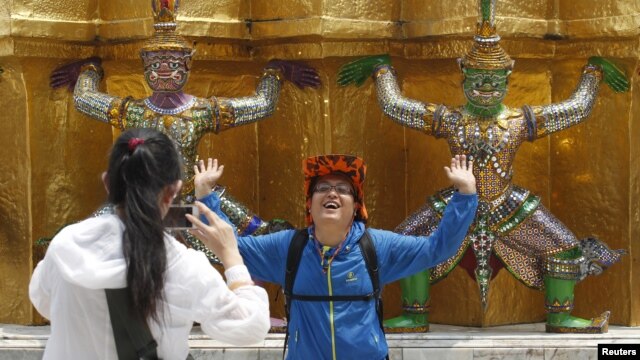
FILE - A Chinese tourist strikes a similar pose to statues as they visit the Grand Palace in Bangkok, March 23, 2015.
BEIJING—
In China, four people have been placed on the country's new “tourism blacklist” which was created to punish citizens who are caught misbehaving at home and abroad.
One of the four was a Chinese teenager who stood on top of a statue of a military soldier in northeastern China and had his picture taken. China says the teen will now be blacklisted and banned from participating in travel groups for ten years.
Rachel Lu, an editor at Foreign Policy magazine, says the Chinese government is paying close attention to China’s new tourists, and how their behavior impacts China’s global image.
“I think in recent years because of the explosion of Chinese tourists abroad they have gotten a lot of negative attention for what they are doing, you know, cutting in line, crowding, taking pictures,” she said.
The black-listed teen, Li Wenchun, was at the Red Army Memorial Garden in Yan’an in northwestern China, a place where the Red Army took shelter after their Long March through China in the 1950s.
According to Chinese state media Li posed for photos on top of a military soldier statue which were then posted online, sparking public condemnation.
The other citizens black listed include a couple which threw a bowl of hot noodles at a Thai stewardess on a flight from Bangkok to Beijing after becoming angry over their seating arrangements. The fourth person on the black list forcibly opened emergency doors on a domestic plane flight.
Chinese state media says being blacklisted will have a “negative influence” on citizens’ ability to obtain bank credit and their applications for foreign visas. Lu says the government is trying to send a strong message to Chinese travelers.
“So they are taking steps to basically publicly name and shame some individuals who are viewed as behaving badly while they are away from home,” she said.
Strong message
As China’s rising middle class travels domestically and abroad in increasingly large numbers, its tourists are making significant economic and in some cases cultural impacts in the places they visit.
While many countries are eager to lure the rising number of Chinese tourists to boost local economies, incidents involving Chinese tourists behaving badly alos have spread in news media and online. Stories of tourists spitting in public or admonishing service workers have drawn news coverage abroad. In Thailand, a celebrity recently recorded a video mocking Chinese tourists cutting in line at an airport in Seoul which drew thousands of online viewers.
China’s government says it is also fighting corruption within the tourism industry and has publicly reprimanded tour guides who attempt to coerce travelers into spending large sums of money during trips.
But of the four citizens black listed, Li Wenchun will remain on the list the longest — 10 years. Lu says that may be because his transgression as a tourist was also a show of disrespect to China’s Communist Party.
“So that act of standing on top of a military soldier statue is viewed as more morally reprehensible by the Chinese government than these others acts which are also bad but not as bad,” she said.
Nearly one in ten international tourists globally is now Chinese, and the number of Chinese tourists traveling abroad for leisure is expected to double within the next five years. |
|
